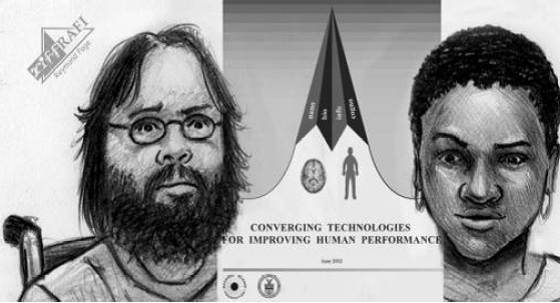Soumis par ETC Staff le
Issue:
In the USA, senior science policy makers and industry players are devising a new-style 'Manhattan' or 'Apollo' project to merge strategic technologies at the nano-scale (one billionth of a meter). Their aim is to combine biotechnology, information technology and cognitive (neural) science with atomtechnology at the nano scale (see The Big Down). The operative unit in information science is the Bit; nanotechnology manipulates Atoms; cognitive science deals with Neurons and biotech exploits the Gene. Together they make B.A.N.G. Merging these technologies into one, proponents say, will drive a huge industrial revolution and a societal "renaissance" that will guarantee American dominance - military and economic - through the 21st century. The US Government’s National Science Foundation refers to this convergence of technologies as NBIC (nano-bio-info-cogno); ETC Group calls it the Little BANG (Bits-Atoms-Neurons-Genes) Theory.
On December 3-4, 2001, the National Science Foundation (NSF) and Department of Commerce (DOC), at the request of the Interagency Subcommittee on Nanoscale Science, Engineering and Technology (NSET), convened a workshop in Washington DC entitled Converging Technologies for Improving Human Performance.” The purpose of the workshop was to explore technological convergence at the nano-scale – bringing together NBIC/BANG technologies. Eighty-one people from government, academia and industry participated. As the organizers put it, “convergence of diverse technologies is based on material unity at the nanoscale and on technology integration from that scale.” 1In other words, when the known world is reduced, literally, to atoms and molecules made up of chemical elements, the difference between life and non-life – between biology and art – ceases to exist. The fundamental building blocks of bio, info and neuro are ‘materially unified’ at the nano-scale and therefore can be combined, or otherwise manipulated through, atomtechnology. Rather than a convergence of equals, the Little BANG Theory represents a coup by atomtechnologists asserting the primacy of the atom as the key to advancing other powerful technologies.
Impact:
If government, academia and industry succeed to make the Little BANG Theory a reality (they will advance their projects at a seminar in Los Angeles, CA, February 6-7, 2003), it will profoundly affect national economies, trade and livelihoods – in countries of both the South and North. Human security and health – even cultural and genetic diversity – will be firmly in the hands of a convergent technocracy. Atomtechnology will also have profound implications for global food and agricultural production. The US government’s National Nanotechnology Initiative is preparing a report on the impact of nano-scale technologies on food and agriculture and the US 2004 nanotechnology budget proposes a 900% increase in the Department of Agriculture’s allotment to $10 million.
Policies:
None so far, but ETC Group urgently recommends that a transparent international process is begun through the United Nations to establish an International Convention for Evaluation of New Technologies (ICENT).
| Fichier attaché | Taille |
|---|---|
| 0 octets |

